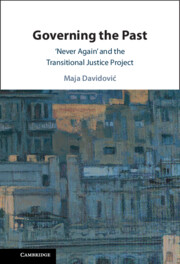Refine search
Actions for selected content:
5 results
7 - Agency amid Anxiety
-
- Book:
- Governing the Past
- Published online:
- 30 July 2025
- Print publication:
- 07 August 2025, pp 179-202
-
- Chapter
- Export citation
1 - Introduction
-
- Book:
- Governing the Past
- Published online:
- 30 July 2025
- Print publication:
- 07 August 2025, pp 4-34
-
- Chapter
-
- You have access
- HTML
- Export citation
8 - Conclusion
-
- Book:
- Governing the Past
- Published online:
- 30 July 2025
- Print publication:
- 07 August 2025, pp 203-213
-
- Chapter
- Export citation
4 - ‘If We Do Not Talk About These Issues Now …’
-
- Book:
- Governing the Past
- Published online:
- 30 July 2025
- Print publication:
- 07 August 2025, pp 95-123
-
- Chapter
- Export citation

Governing the Past
- ‘Never Again' and the Transitional Justice Project
-
- Published online:
- 30 July 2025
- Print publication:
- 07 August 2025
